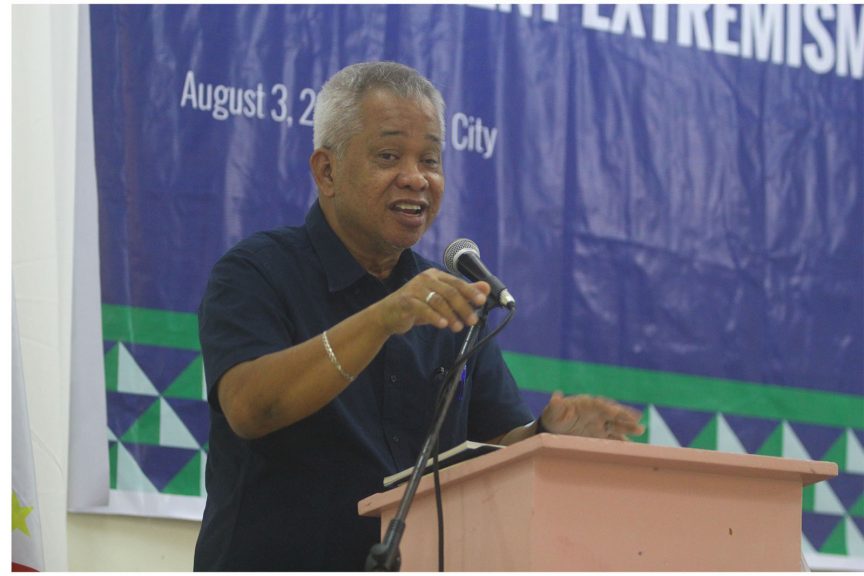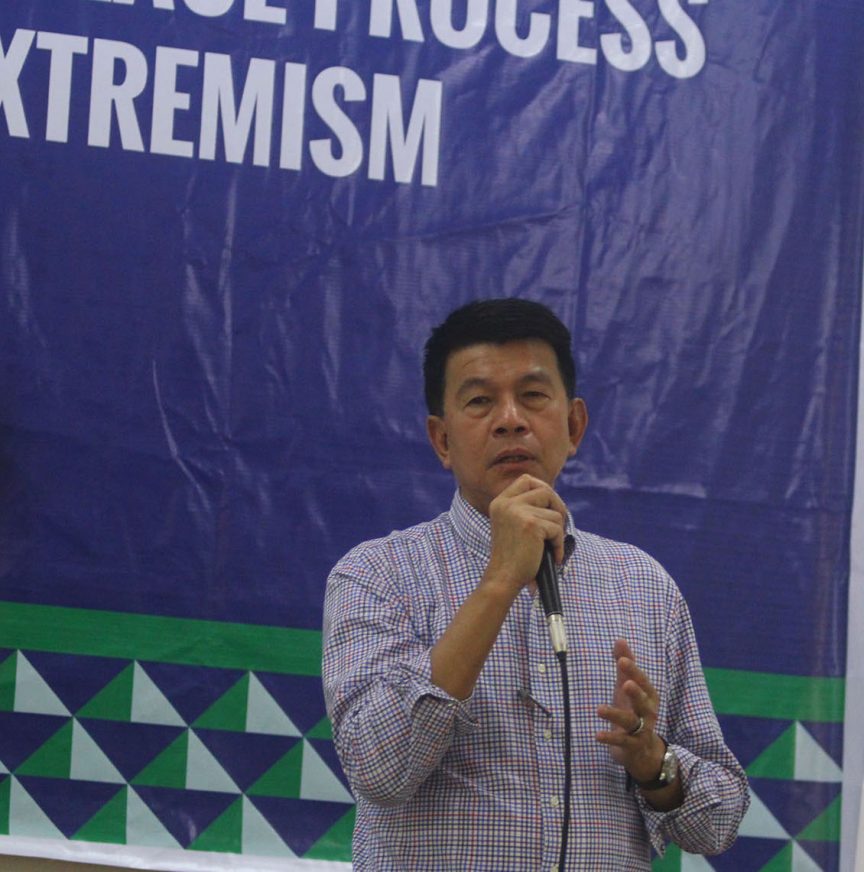 Commissioner Jose Lorena Jr. during the Media Forum on the Bangsamoro Peace Process and Violent Extremism in Davao City. August 3, 2018. MindaNews photo by GG BUENO
Commissioner Jose Lorena Jr. during the Media Forum on the Bangsamoro Peace Process and Violent Extremism in Davao City. August 3, 2018. MindaNews photo by GG BUENO
DAVAO CITY (MindaNews/ 04 August) – The proposed Bangsamoro region will have more means to develop itself as it will keep all tax collections for the first 10 years after its creation and a 75% share thereafter, Undersecretary Nabil Tan of the Presidential Adviser on Peace Process said on Friday.
Tan said the present Autonomous Region in Muslim Mindanao (ARMM), which will be replaced by the Bangsamoro Autonomous Region in Muslim Mindanao if the Bangsamoro Organic Law (BOL) gets ratified in a plebiscite by November or December this year, lacks the fiscal autonomy that would unlock its potentials.
Speaking in a media forum on the Bangsamoro Peace Process and Violent Extremism at the Linmarr Hotel here on Friday, Tan said the Bangsamoro government will get 75% from local taxes and 25% will go to the national government after 10 years.
President Rodrigo Duterte signed the BOL on July 27, four days after his third State of the Nation Address.
Tan, implementing panel chair of the government in the peace process with the Moro Islamic Liberation Front, said the ARMM needs congressional approval of its budget.
“The resources are not provided. Every year, we have to beg to Congress. Meanwhile, it’s in the organic law before that the region shall appropriate the funds, pass the bill. What is there to appropriate? There is no income,” he said.
The BOL, previously called the Bangsamoro Basic Law, provides for the annual block grants that are automatically appropriated for the region and special development fund to be allotted for the rehabilitation of conflict-ravaged communities.
Bangsamoro Transition Commission (BTC) member Jose A. Lorena Jr. said the existing law provides for provisions on equitable share from national revenues.
But he lamented that it was not translated into real terms, making ARMM “not fiscally capable to deliver the services that it is intended to deliver, because it has no fiscal autonomy.”
 Undersecretary Nabil Tan
Undersecretary Nabil Tan
Under BOL, he said block grants will be given under which the Bangsamoro government will receive 5% share from net collection of the Bureau of Internal Revenue and 5% share from the net collection of the Bureau of Customs, estimated by the Department of Finance to reach P67 billion.
“They are still short compared to other regions because other regions are receiving above P70 billion but at least they are now closer to us. Perhaps, in due time, they can cover up and there would be development at par in all regions of Mindanao,” he said.
“Public investment has been short in the Bangsamoro, that’s why private investment will not follow. As a professor in economics before, I do understand that,” he said.
With the block grant, he said the Bangsamoro parliament will now approve the regional budget.
Lorena said the BOL provides for the creation of the Bureau of Local Government Finance (BLFG) that will ensure internal control for funds from the Internal Revenue Allotment.
He clarified that that this is separate from the Commission on Audit (COA).
He said they need to add another layer of auditing, the pre-audit, because what the COA does is post-audit.
“If you have already released the money, there is no internal control, then the only remedy is to go to Ombudsman. But the money has already been expended and delivery of services have already been affected because money has already been technically used for purposes other than what is intended,” he said.
He said he hopes the region would attain peace and stability as they envision an autonomous Bangsamoro that can support national development.
“If the abundance of the region can be fully utilized, it will not only contribute to that region but even contribute to the coffers of the entire country and we will be able to march forward to new heights of economic development,” he added.
“The Bangsamoro region is a region of abundance. It has rich resources – mining, marine resources, timber area– untapped resources. But the question is, why are we poor? Technically the answer is always because while we are not hit by typhoon or eruption of Mayon Volcano we are hit by a calamity called conflict,” he said.
He said the Moro people have often been displaced from their farms to evacuation centers.
This time, Lorena said the Bangsamoro government is given the subsidiarity that allows them to address internal issues.
“Subsidiarity is a concept common to all of us. If I have a problem with my wife in the house, we should be the ones who should solve the problem because we know the problem well. We should not allow somebody from the outside to provide the solution for all our problems,” he said. (Antonio L. Colina IV/MindaNews)
